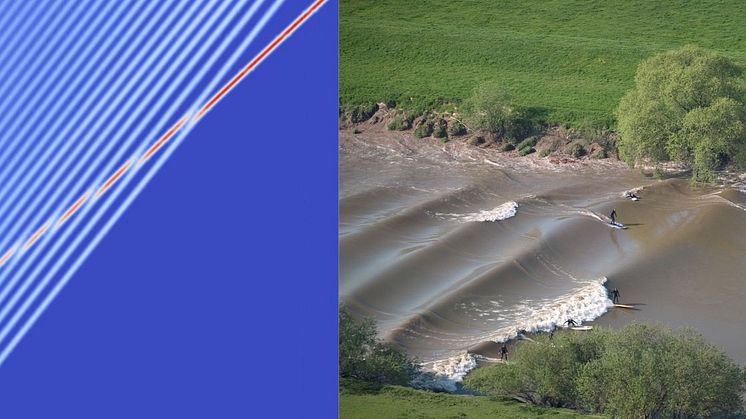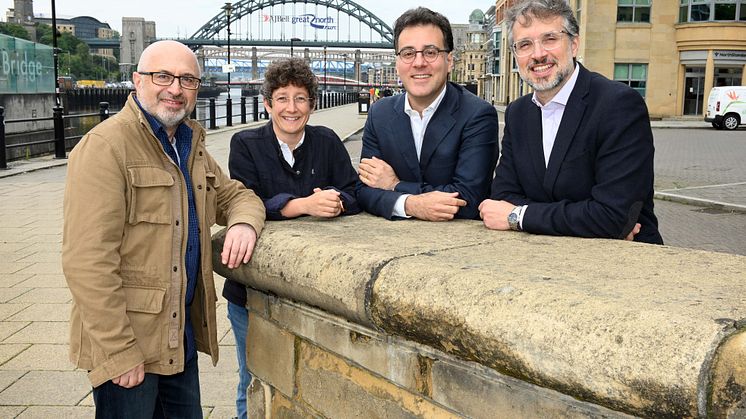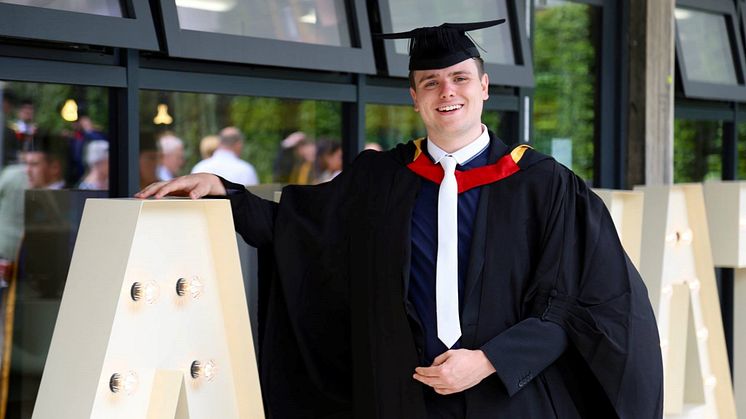
Press release -
Making waves – Northumbria leads the way in dispersive hydrodynamics research
Northumbria University, Newcastle has bolstered its reputation as a world leader in a newly emerging field of applied mathematics after hosting an international, six-month-long programme, featuring experts from around the world.
Dispersive hydrodynamics is a mathematical framework which can be used to understand the mechanisms for emergent complex behaviours in non-linear waves, for example, the formation and development of rogue waves and tsunamis in the ocean
Remarkably, the methods of dispersive hydrodynamics transcend the field of fluid dynamics and can be applied to the description of phenomena of different physical nature, from the propagation of high-power light signals through optical fibres with application to telecommunication systems, to statistical mechanics and neural networks.
It is a relatively new area of research – the first workshop dedicated to the subject was held just 10 years ago and organised by Northumbria University’s Dr Antonio Moro, co-founder of the University’s Mathematics of Complex and Nonlinear Phenomena (MCNP) research group.
This year Professor Gennady El and Dr Antonio Moro, along with members of the MCNP research group, have organised an in-depth programme covering a broad range of research activities including workshops, seminars and open for business events dedicated to dispersive hydrodynamics.
Based at the Isaac Newton Institute (INI) for Mathematical Sciences in Cambridge, the programme began in July and runs until this Friday, with academics from the UK, America, Japan, Canada, Europe and the Middle East visiting during the six months.
Professor Ulrike Tillmann FRS, NM Rothschild & Sons Professor and Director of the INI said: “The Dispersive Hydrodynamics Programme exemplifies what the Newton Institute is best at – bringing different scientific communities together for an extensive period of time out of which new collaborations and results come forward.
“In this case it has been mathematicians and physicists working on multiscale wave phenomena. We are grateful to the organisers and especially our colleagues in Northumbria University, who under the leadership of Professors Gennady El and Antonio Moro have formed a core group throughout the programme.”
There have already been a number of promising research developments come about as a result of the programme, with several academic papers written and ideas for joint grant proposals generated. In addition, there have been some exciting collaborations with industry – presenting opportunities to apply the mathematical theory being discussed to real-life challenges.
Giulia Marcucci is Academic in Residence and Scientific Advisor at Apoha, a London-based start-up working on developing Liquid Brain – a new sensing and computing paradigm using physics of complex systems.
She contributed to the first in a series of Open for Business events, entitled From Dispersive Hydrodynamics to Forecasting to Machine Learning and back, which took place at the ICI in October as part of the Northumbria programme.
Speaking about her involvement, she said: "The effort of the scientific community in understanding hydrodynamical extreme events and exploiting this knowledge to help anybody take on the current most impactful problems, such as global warming and the rapid technological changes taking place as part of the fourth industrial revolution, is impressive.
“The heterogeneity of such a broad community was remarkably well-represented in this workshop, gathering together experts in applications of AI to nonlinear waves from every field. It was a pleasure to take part in this remarkable initiative, where academia and industry met, moved by the same purpose – leading the scientific development toward building a better future.”
Professor El added: “This programme of events is celebrating the marriage between theory and experiment. It has provided an opportunity for mathematicians from around the world to share ideas and work together to come up with new ways to apply the theory of dispersive hydrodynamics to real-life situations.
“Along with broad mathematical developments, one of the aims of the programme has been to identify any outcomes which could have an impact in the non-academic world. For example, this particular field of mathematics could be applied to the areas of oceanography, climate change and meteorology.”
Dr Moro added: “This programme has presented us with a really unique opportunity to bring together experts in this very exciting field of mathematics in a concentrated effort to develop our understanding.
“It is very exciting to see the developments which have been made already, but this is just the start – the connections and partnerships which have been forged over the last few months will continue to grow and we are looking forward to seeing what new discoveries and applications come as a result of this event.”
One area in which dispersive hydrodynamics theory could have massive impact is in predicting rogue or ‘freak’ waves – unusually large and unpredictable surface waves which appear suddenly and can be devastating if they come into contact with ships or coastal structures such as offshore oil platforms.
Dispersive Hydrodynamics has the potential to help oceanographers and meteorologists uncover the mystery behind rogue waves, improving prediction of such phenomena, potentially saving lives and livelihoods.
The programme has also seen the direct involvement of other academic institutions across the UK and abroad with a satellite workshop at the Department of Mathematical Sciences, Loughborough University, a thematic workshop at the Mathematical Institute, University of Oxford hosted by Oxford Centre for Nonlinear Partial Differential Equations, and a joint workshop with the Research Institute for Mathematical Sciences, Kyoto University.
The Dispersivehydrodynamics: mathematics, simulation and experiments, with applications in nonlinear waves programme will run until 16 December 2022. It is hoped a follow-up event will take place in 2024 at Northumbria University, hosted by the Mathematics of Complex and Nonlinear Phenomena (MCNP) research group.
Professor John Woodward, Pro Vice-Chancellor for Northumbria’s Faculty of Engineering and Environment, said: “The MCNP research group’s involvement in this conference and contributions to research in this field is putting Northumbria at the forefront of nonlinear waves research. The future of this emerging field is filled with possibilities.”
Find out more about Northumbria University’s Department of Mathematics, Physics and Electrical Engineering and Mathematics of Complex and Nonlinear Phenomena research group.
Below is an introductory video made at the start of the conference.
Topics
Categories
Northumbria is a research-intensive modern university with a global reputation for academic excellence. Find out more about us at www.northumbria.ac.uk --- Please contact our Media and Communications team at media.communications@northumbria.ac.uk with any media enquiries or interview requests ---











